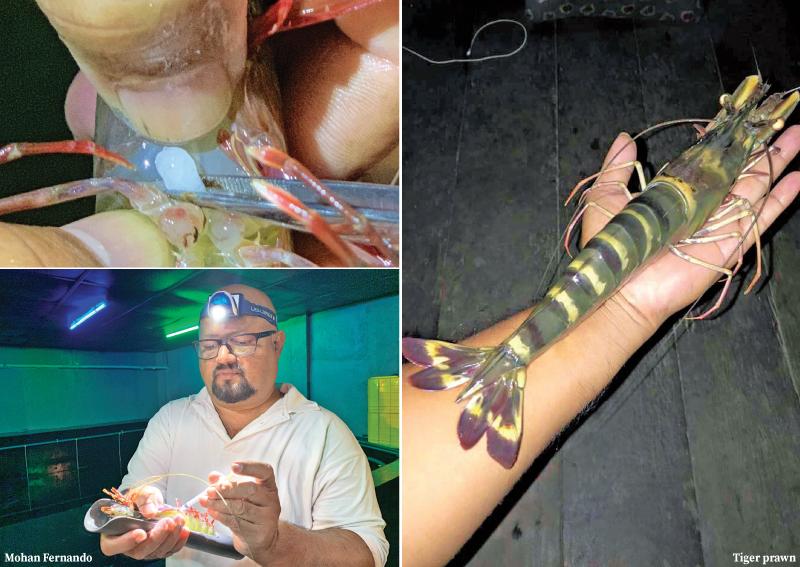
Sri Lanka’s prawn industry is a lucrative business and a good foreign exchange earner, said Chairman and Managing Director of Blue Lagoon Aquaculture (Pvt) Ltd., Mohan Fernando, a long-standing industrialist.
He ventured into the prawn industry in 1996 and started breeding using mother prawns captured (wild catch) from the sea.
The continuous release of cultured prawns into the surrounding water bodies and inbreeding as a consequence, caused the weakening of the wild brood stock and as a result the post larvae also became weak and more vulnerable to diseases. Growth has also slowed down triggering size variations.
Fernando said that the country’s prawn industry is over four decades and it is necessary to introduce domesticated brood stock with Specific Pathogen Free (SPF) cultures as the way forward.
He undertook an in-depth study of the industry and practices adopted by other countries to overcome the problems faced by the farmed prawn industry. He travelled widely to prawn farming countries such as Thailand, Vietnam and India where the industry is flourishing today.
The outcome of his extensive studies spanning over five years was the conviction that Lanka’s prawn gene pool needs upgrading and revitalisating. To achieve this he plans to introduce SPF brood stock as he is convinced that it is the only solution to develop the prawn industry.
He also used his hard earned money to fund studies for over five years to learn the technique of artificial insemination of the mother prawns, as they do not mate naturally. SPF larvae are Peneaus Monodon prawns which can and will grow to over 40 grams if SPF material is used. These sizes according to the exporter are much sought after by importers and will definitely fetch premium prices. However, in Sri Lanka there is no institution or government agency willing to contribute towards this measure.
Recently, the National Aquaculture Development Authority (NAQDA) decided that this measure was needed to develop the prawn industry. NAQDA selected Mohan Fernando to implement the first SPF brood stock program as a Public-Private Partnership (PPP).
He acknowledged with gratitude the assistance he received as a grant from the Agriculture Sector Modernisation Project - Value Chain Development scheme of the Ministry of Social Welfare and Primary Industries initiated by Minister of Primary Industries and Social Empowerment, Daya Gamage.
This grant helped Fernando to improve infrastructure facilities in his hatchery and bring it to the requisite standards to breed SPF quality prawn larvae and the first batch of mother brood stock was imported from Thailand for breeding.
It took him nearly 45 days to successfully produce the first batch of SPF Post Larvae with fast growth and negligible size variation.
This positive factor should be used to develop the local prawn industry and to enable it to contribute to the economy in a big way. He hopes his pioneering effort will direct the whole industry on the correct path and contribute to increase the earning potential of the now struggling prawn farming community and increase foreign exchange earnings which will benefit the economy.
Fernando said, “We could export these prawns as a premium product to the international market. At present our main importers are Japan, the European Union, the USA and a few Asian countries.”
The prawn industry which was mostly confined and centered in the coastal belt of the Puttalam district, has now spread to Batticaloa, Mannar and Jaffna.
The industry was among the top foreign exchange earners in the past. It is one of the main sources of foreign exchange in Asian countries such as India, Thailand and Vietnam.
Sri Lanka’s prawn industry was also at the same level as these countries in the past. However, due to shortsighted policies, the industry could not be developed at the same pace as these countries.
“Exporters say they could earn more foreign exchange due to the quality of the prawns grown in natural water bodies in this country. Farmed tiger prawns from Sri Lanka have a unique sweet taste relished by importers and consistently fetches a higher price than our competitors.”
Today, the industry has to import the food needed to raise the prawns. This is done at a high cost. However, if an industry that could manufacture food for this industry is set up, it will make the whole operation more profitable. This will also save the country the foreign exchange that is now spent on the import of prawn food.
Since this venture should be carried out on a large scale, government patronage at the initial stages will be useful.
This industry is a high foreign exchange earner and labour intensive. With the potential for large scale employment generation it is an industry that the government should look at more carefully, he said.
